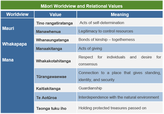Maori Case Study
The design of the sustainability assessment and learning tool for Māori in the collectively-owned asset sector (Raumanga Rōnaki Mahingakai), has been finalised and integrated into a survey tool (Fluid Surveys). It has been tested and will be shortly deployed using an ongoing testing and calibrating process, among different Māori organisations including Te Rūnanga o Ngāi Tahu, Ngāti Awa, the office of the Māori Trustee, and various Incorporations & Trusts. The survey consists of about 500 questions across 8 modules targeting key areas of organizational practice. Survey results will inform organizations of current practice in comparison to ‘best sustainable practice’. Various modes of reporting are generated including: values-based reporting, module, quadrupal bottom line (four sustainability pillars) and mauri (Life Sustaining Capacity). For more information, check the presentation below.
|
Raumanga Rōnaki Mahingakai

August 2015
Presentation prepared for Stakeholder Workshop - 6 August 2015. |
Available Reports

Research Summary 14/01 - INDIGENOUS FRAMEWORK - MEASURING PERFORMANCE FROM A MAORI CULTURAL PERSPECTIVE - Summary of the 13/06 Research Report
13/06 Research Report - Reid J.; Barr T.; Lambert S. (Varona G ed.) (2013). Indigenous sustainability indicators for Māori farming and fishing enterprises: a theoretical framework.The NZ Sustainability Dashboard Research Report 13/06. Published by ARGOS.
|
Related information
June 2015
Congratulations to John Reid and Matthew Rout - their paper "Getting to know your food: the insights of indigenous thinking in food provenance" has just been published (online first) in Agriculture and Human Values (Journal of the Agriculture, Food and Human Values Society) - and is available here.
Congratulations to John Reid and Matthew Rout - their paper "Getting to know your food: the insights of indigenous thinking in food provenance" has just been published (online first) in Agriculture and Human Values (Journal of the Agriculture, Food and Human Values Society) - and is available here.
June 2015
Dr John Reid has provided a presentation entitled "Building Tribal Enterprises Based on Traditional Worldviews and Values: Can they compete in global capitalist markets?” as part of the session “(Re)constructing Indigeneity and Tackling Markets in Aotearoa/New Zealand” at the Native American and Indigenous Scholars Association Conference. 4-6 June 2015, Washington DC, USA. This is the largest indigenous scholars’ conference in the world with over 1000 attendees.
Dr John Reid has provided a presentation entitled "Building Tribal Enterprises Based on Traditional Worldviews and Values: Can they compete in global capitalist markets?” as part of the session “(Re)constructing Indigeneity and Tackling Markets in Aotearoa/New Zealand” at the Native American and Indigenous Scholars Association Conference. 4-6 June 2015, Washington DC, USA. This is the largest indigenous scholars’ conference in the world with over 1000 attendees.

2-3 November 2014
Dr John Reid has provided a presentation at the 5th ICMNS (International Conference on Mathematics and Natural Sciences), Bandung, Indonesia.
The title of his presentation was: "Insights from Cross-Cultural and Transdisciplinary Research in Sustainable Food and Fibre Production".
Dr John Reid has provided a presentation at the 5th ICMNS (International Conference on Mathematics and Natural Sciences), Bandung, Indonesia.
The title of his presentation was: "Insights from Cross-Cultural and Transdisciplinary Research in Sustainable Food and Fibre Production".


